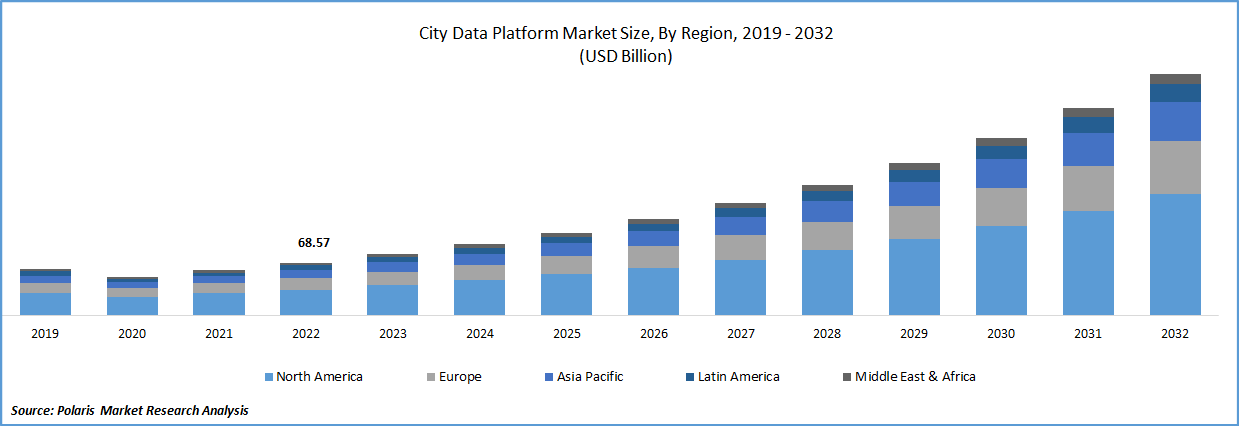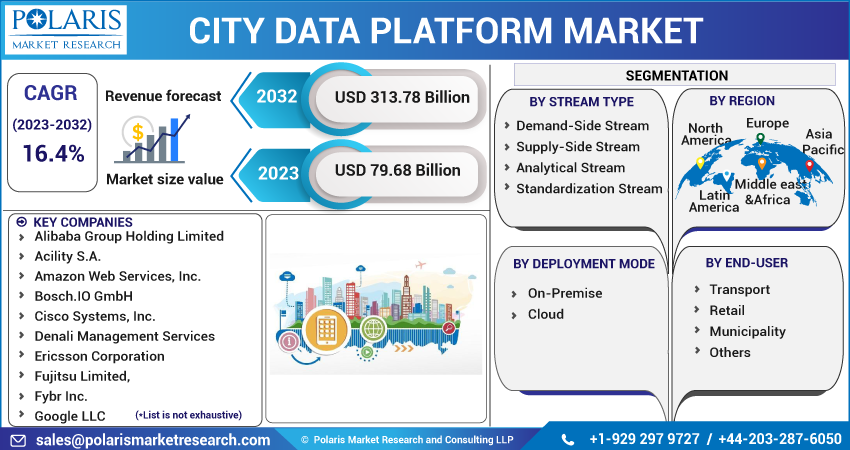
City Data Platform Market Share, Size, Trends, Industry Analysis Report, By Stream Type (Demand-Side Stream, Supply-Side Stream, Analytical Stream, and Standardization Stream); By Deployment Mode; By End-User; By Region; Segment Forecast, 2023 - 2032
- Published Date:Jul-2023
- Pages: 119
- Format: PDF
- Report ID: PM3489
- Base Year: 2022
- Historical Data: 2019-2021
Report Outlook
The global city data platform market was valued at USD 68.57 billion in 2022 and is expected to grow at a CAGR of 16.4% during the forecast period. City data platforms combine a substantial quantity of data, including data from numerous industries, including transportation, energy, crowd-sourced data, etc., and offer a comprehensive picture of information to enhance and create cutting-edge smart city services. The city data platform gathers information from a variety of sources, which is useful when implementing new systems for water distribution, crime prevention, and transportation. Platforms for city data can process both historical and real-time data. The information is gathered from various data sources, recorded, and then processed in city data systems. Then, it is supported by applications and external data analyses that connect to a city data platform.

To Understand More About this Research: Request a Free Sample Report
Urbanization and population growth are happening quickly worldwide. According to the United Nations, by 2050, it is anticipated that 68% of the world's population will reside in cities. Urbanization is also anticipated to rise further shortly, which will boost the expansion of the city data platform market even more as cities with large populations fuel economic growth in the majority of countries.
Additionally, innovation and digital technology must be used to reduce energy consumption and enhance the quality of life to address expanding urbanization trends and worries about climate change. To handle urbanization concerns and assure sustainability, innovation must be integrated with energy, digitalization, and communication and information technologies. This is projected to fuel the expansion of the market in the near future.
However, the accuracy and standardization of the data sources used by city data platforms mean that the quality of the data they collect may not always be adequate. As a result, a key challenge impeding the growth of the market for municipal data platforms is the low quality of the data. Additionally, it is challenging for city data platforms to combine the data because it is gathered from several institutions, each of which has a distinct data structure. Hence, another difficulty limiting the market expansion for city data platforms is the integration of data.
The alarming rise in COVID-19 cases has forced many companies and their employees to adapt to remote working and work-from-home standards, which has increased demand for automation and IoT solutions across a wide range of industries as well as in people's personal life. Furthermore, since COVID-19 has spread, firms have been obliged to refocus their efforts and expand their remote operations, which has increased demand for city data platforms. Furthermore, city data platforms assisted cities and local governments in the deployment of intelligent monitoring technologies in densely populated public spaces. Those elements affected the need for city data management platforms, fostering the market expansion for platforms at the time.

For Specific Research Requirements, Request for a Customized Report
Industry Dynamics
Growth Drivers
The Internet of Things (IoT) technologies and wireless connection infrastructures with the aid of transmitters, sensors, and other devices compose the basis of the city data platform concept. This idea of municipal data platforms has led to the generation of a sizable amount of data through these gadgets and aids cities in better asset management. With the use of smart city technologies, cities can be made safer, greener, and more effective.
Further, Cities are being equipped with IoT sensors to measure and monitor everything, including air quality, traffic patterns, and criminal activity. Urban areas may run more smoothly, sustainably, and efficiently because of IoT, which improves inhabitants' quality of life while also saving money. Examples include traffic lights, parking, environmental sensors, and garbage management. There are security issues, as there always are when huge volumes of private and public data are exchanged, but they don't seem to have had much of an effect on growth. As per the CNBC report, through 2035, cities will invest roughly $41 trillion "to modernize their infrastructure to profit from the IoT." This could result in significant cost savings as well.
Report Segmentation
The market is primarily segmented based on stream type, deployment mode, end-user, and region.
|
By Stream Type |
By Deployment Mode |
By End-User |
By Region |
|
|
|
|
To Understand the Scope of this Report: Speak to Analyst
Cloud-based segment is expected to witness the fastest growth over the projected timeline
The segment is growing at the fastest pace due to the rising adoption of the internet across the globe. Also, it makes it easy to manage bulk data in one place. Bundling various data types is necessary for intelligent urban planning and management. The only way to aggregate and analyze data to enable data-based community and urban development is through all of this. Hence, the technical foundation of all intelligently networked communities is made up of data platforms and cloud-based services. The data platform allows data consumers and suppliers to interact with each other in a "data marketplace," enabling the development of goods and services that add value to the lives of residents.
Apart from this, information technology abilities can now be employed as a service owing to cloud computing, the next stage in the development of internet-based computing. The Internet of Things can improve throughput, productivity, and productivity as smart devices leave the cloud infrastructure area. Residential areas that work diligently to achieve sustainable development, urban system authority, enhanced health, knowledge development, and network-driven advancement are known as smart cities.
A network may now supply information and communication technology (ICT) resources owing to cloud computing, which is the next stage in the development of internet-based computing. Productivity, performance, and payload may all be improved in cloud infrastructure, which is advantageous for IoT. The way that creation, dissemination, and commercial electronic packaging have been enabled by cloud computing presentation. Because of this, IoT and the cloud are now very close to upcoming internet technologies that are interoperable with IoT systems. As a result, this internet adoption has increased the demand for cloud-based city data platforms that are boosting segmental growth.
The demand in North America is expected to witness significant growth
North America currently dominates the market in terms of region, and it is anticipated that it will continue to do so throughout the forecast period as a result of the region's highly developed ICT industry and high consumer spending, both of which contribute to the market's expansion for city data platforms. Due to the widespread use of cutting-edge technology products and the rules and restrictions put in place by governments in this area, North America is anticipated to hold the greatest market share of the city data platform market.
Further, due to the growing number of smart cities in Europe and the APEJ, the need for city data platforms is anticipated to increase rapidly in these countries. Only a few German cities, districts, and communities now have data platforms that satisfy the standards and specifications for Smart City data platforms. There are still a few municipalities in Germany that are utilizing Smart City platforms and are struggling with several obstacles.
The Asia-Pacific region is anticipated to experience considerable growth throughout the projection period due to several regional government initiatives and advancements in digital transformation that are anticipated to drive market expansion in this area. On the one hand, there are now significant legal and technical-regulatory issues surrounding the purchase of Smart City data systems. On the other hand, when making a purchase, a potential operating concept must be taken into account. The acquisition of Smart City data platforms is associated with a significant risk in terms of content and expensive expenditures due to the current very unknown needs.
Competitive Insight
Key players include Alibaba Group, Acility S.A., Amazon Web Services, Bosch.IO, Cisco Systems, Denali Management, Ericsson Corporation, Fujitsu Limited, Fybr Inc., Google, Hitachi, Inspur Technologies, Lumani, Nexpa Systems, and Quantela.
Recent Developments
- In October 2021, Cegeka develops the Mobilize data platform for smarter and more proactive transportation policy due to data-driven mobility insights. The Mobilize data platform, which is being introduced by Cegeka, provides data-driven traffic insights and enables decision-makers to start working right away. With access to cutting-edge technologies like big data and artificial intelligence, they offer solutions that assist individuals in making decisions more quickly and effectively.
City Data Platform Market Report Scope
|
Report Attributes |
Details |
|
Market size value in 2023 |
USD 79.68 billion |
|
Revenue forecast in 2032 |
USD 313.78 billion |
|
CAGR |
16.4% from 2023- 2032 |
|
Base year |
2022 |
|
Historical data |
2019- 2021 |
|
Forecast period |
2023- 2032 |
|
Quantitative units |
Revenue in USD billion and CAGR from 2023 to 2032 |
|
Segments Covered |
By Stream Type, By Deployment Mode, By End-User, By Region |
|
Regional scope |
North America, Europe, Asia Pacific, Latin America; Middle East & Africa |
|
Key Companies |
Alibaba Group Holding Limited, Acility S.A., Amazon Web Services, Inc., Bosch.IO GmbH, Cisco Systems, Inc., Denali Management Services, Ericsson Corporation, Fujitsu Limited, Fybr Inc., Google LLC, Hitachi, Ltd., Inspur Technologies Inc., Lumani PTE. Ltd., Nexpa Systems Co. Ltd., and Quantela, Inc. |
FAQ's
The Global city data platform market size is expected to reach USD 313.78 billion by 2032.
Key players in the city data platform market are Alibaba Group, Acility S.A., Amazon Web Services, Bosch.IO, Cisco Systems, Denali Management, Ericsson Corporation.
North America contribute notably towards the global city data platform market.
The global city data platform market is expected to grow at a CAGR of 16.4% during the forecast period.
The city data platform market report covering key segments are stream type, deployment mode, end-user, and region.
